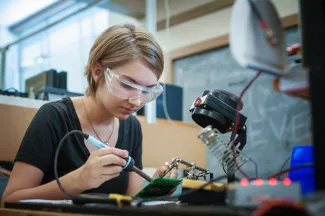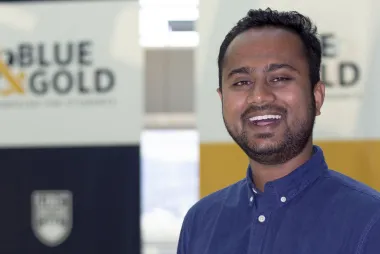"Take chances, say yes a lot, and many opportunities will come your way. Don’t forget to feed the ducks!"

Hibatallah Alwazani
- Degree: Master of Applied Science
- Grad year: 2021
- Program:
- Campus: Okanagan
Hi, I am Hibatallah Alwazani and I recently graduated MASc. in Electrical Engineering at UBC in 2021, and am currently pursuing my Ph.D in Electrical Engineering at UBC. I stepped foot into the snowy banks of the beautiful city Kelowna on January of 2020. Reflecting on the past year, I can say with certainty that it was the most difficult year of my life but because of that also the most rewarding and memorable.
My studies focused on wireless communication, in particular an exciting new topic called intelligent reflecting surfaces (IRS)s. It is an additive technology that can be used with existing communication systems to enhance communication standards for future generations. My thesis revolved around providing the theoretical foundations for the IRS assisted wireless systems and tackle the existing problems within this technology. My thesis was, for lack of a better word, awesome. It was so much fun imagining a practical IRS assisted wireless system model, then writing down all the parameters of this model, finding an abstraction that fits and can solve for, and then finding different methods to solve it. Taking an amorphous idea, sculpting it into a working model, then manifesting it through simulations and mathematical analysis is an incredible and indescribable journey.
Why did you choose to go into your field of study at UBC?
Before applying for graduate studies, I asked my friends who are already studying for higher studies the most significant question: "what do I look for in a supervisor?" My friends all converged on a similar answer; the supervisor needs to be as interested in the topic as you are with a deep knowledge of your research subject, so that they can help and guide expertly. The second, overlooked aspect is that the supervisor needs to be flexible enough that the student can tackle research in their own way at their own time and not conform to the popular method of ‘publish or perish’ mentality.
Thankfully, I lucked out in both aspects as Prof. Anas Chaaban is the most brilliant professor I have come across. Every time I ask him a question pertaining to the research work in our weekly meetings, and I asked a lot of conceptual questions, he proceeded to answer in a concise fashion and in a visual manner that really drove the idea home to me. The sheer amount of mentoring he has given me is priceless, and I continued my PhD not only because of the outstanding teaching environment here at UBCO, but also because of my supervisor.
What has made your time at UBC memorable?
The work-study project was about creating a graphical interface that is user-friendly and will eventually be utilized as a learning tool for communication students to learn about wireless and digital communication. This real outcome of a project undertaken by me is memorable because it will have a lasting contribution on the engineering community. It is important, I have come to understand during abstract research, to see real outcome affect real people. Otherwise, most research does not produce feelings of short-term achievement. An example for short-term achievement can come from tutoring a struggling student and then seeing that student get an A on his next test. One must be patient to find long-term achievement— for my track, it could possibly take years before I can see the effect of my work on people. That is why I advise each student pursuing research to take the time to work on hands-on projects or take TA positions that focus on creating engineering tools or labs and discover their purpose.
Tell us about your experience in your program. What have you learned that is most valuable?
I have learned that research is mainly will-power. It is you, the papers you read, and the empty word document that you fill out with original, carefully-chosen words and cultivated thoughts. Your supervisor will tell you where to go, but even then, you might get lost since there are so many dead-ends, and those dead-ends might take a long while to find your way out of, but you will find a way out.
I never expected to learn how to teach while I was studying— in fact, having so many work opportunities provided to me was my favourite part about the university. I was not only interested in financial gain, because eventually my life goal is to teach undergraduate students effectively, concisely, clearly, and uniquely. To do that, I needed to start somewhere, and I started in UBC. The feedback system in which the students rank my effectiveness as a TA and give back constructive criticism was also helpful as it made me become better at teaching, understand that pace is everything, and that clear handwriting is my downfall.
What advice would you give a student entering your degree program?
My advice is to surround yourself with people that share your interest and will be able to speak your language. Otherwise, research is a journey one takes alone and that might get lonely if there are no colleagues to discuss your new results with. Meet people, take chances, say yes a lot and many opportunities will come your way. Don’t forget to feed the ducks! UBCO is a beautiful campus, spend time with nature to regain strength mentally. Take the time to go out and make memories with your loved ones. Work and studies will always be there waiting for you when you come back.


